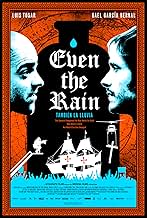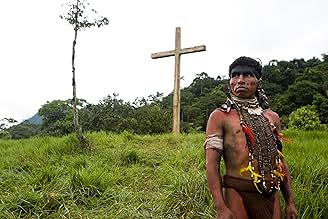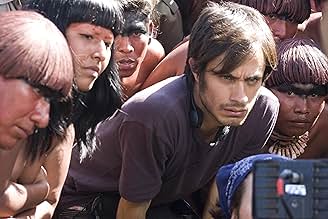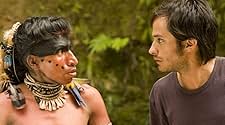As a director and his crew shoot a controversial film about Christopher Columbus in Cochabamba, Bolivia, local people rise up against plans to privatize the water supply.As a director and his crew shoot a controversial film about Christopher Columbus in Cochabamba, Bolivia, local people rise up against plans to privatize the water supply.As a director and his crew shoot a controversial film about Christopher Columbus in Cochabamba, Bolivia, local people rise up against plans to privatize the water supply.
- Awards
- 22 wins & 17 nominations total
- Director
- Writer
- All cast & crew
- Production, box office & more at IMDbPro
Featured reviews
EVEN THE RAIN, directed by Icíar Bollaín, is a compelling film which attempts to explore the history of global economics using a kind of cinematic metaphor. Bollain's film focuses on a multinational movie crew that travels to Bolivia to make a film about Christopher Columbus, and examines his agenda of religious, cultural, and monetary exploitation of The New World. The production company hits a snag when locally violent demonstrations breakout against corporate ownership of indigenous water rights, and threaten to make the completion of the film impossible. The movie shows that the issues of wealth, ownership, and power are just as contentious today as they were five hundred years ago. Corporate giants of our era employ the same greedy strategy in an attempt to steal wealth, power, and access from the uninformed and defenseless. Although the ethical issues in the film are sometimes presented in a slightly heavy-handed manner, by the end of the feature, it is evident that the application of rapacious economic policy hasn't changed much since monarchs ruled the world.
Even the Rain (2010)
There are so many stunning, powerful, dramatic, believable moments to this hard hitting film, you wish so much that there weren't a few unreasonable gaffes to the plot and characters. It's frustrating when a film is almost amazing, because you are reminded of what it was not.
But also what it is, which is pretty thrilling and clever.
First, the contemporary setting is based quite closely on the true events of local Bolivians in the third largest city of the country, Cochabamba, fighting for rights to their own water supply. A private (Euro-U.S.) firm has cornered water rights and when the locals try to use their own handmade supply system the police come and interfere. It's maddening to the point of anger on both sides of the screen. In a way, this local uprising against injustice is the movie, the core of the events.
But what makes it actually fabulous is the way it told through the eyes and cameras of a large film crew working on a movie about Christopher Columbus arriving on the shores of America and mistreating the natives. Yes, a parallel that is obvious but handled with dramatic aplomb. There are many moments showing the shooting of the film, and it transports the viewer instantly and beautifully to the Columbus events, which are epic in their own way. But the characters are part professional actors from other countries and part local (and underpaid) extras, some of whom are involved in the water protests when not filming.
So there are several layers of action, tightly interwoven. The disdain and fear of some of the outsiders is believable (the man playing Columbus, Karra Elejalde, is amazing, world weary and tough, taking both sides as needed). Some of the circa 1500 history of resistance by the natives and even the brave defense of the natives by a Spanish priest is inspiring. And the way it still applies 500 years later (500 years!) is depressing. And energizing.
There are some other small problems, maybe the result of editing down too much later, such as the inclusion at the start of black and white video footage, a documentation of the filming, that you think will then become news footage (or not) but then it just disappears as a component of the film, completely, for no reason. And then the tumult of the last half hour with riots and roadblocks is great stuff, really well done, but so highly improbable you have to just write it off to generous screen writing. We aren't really able to believe the wholehearted change of attitude of the producer (played with intensity by Luis Tosar), but it makes for great interpersonal (and sympathetic) dramatics. And finally the director of the movie within the movie is played by the ever beautiful Gael Garcia Bernal, but in fact he's too weak and thoughtful a type to be directing this sprawling and frankly unmanageable movie about Columbus.
But these objections actually only came up for me later, thinking back. While immersed, I was really immersed and impressed. It's an ambitious, smart, and pertinent movie, with great and enjoyable complexity.
There are so many stunning, powerful, dramatic, believable moments to this hard hitting film, you wish so much that there weren't a few unreasonable gaffes to the plot and characters. It's frustrating when a film is almost amazing, because you are reminded of what it was not.
But also what it is, which is pretty thrilling and clever.
First, the contemporary setting is based quite closely on the true events of local Bolivians in the third largest city of the country, Cochabamba, fighting for rights to their own water supply. A private (Euro-U.S.) firm has cornered water rights and when the locals try to use their own handmade supply system the police come and interfere. It's maddening to the point of anger on both sides of the screen. In a way, this local uprising against injustice is the movie, the core of the events.
But what makes it actually fabulous is the way it told through the eyes and cameras of a large film crew working on a movie about Christopher Columbus arriving on the shores of America and mistreating the natives. Yes, a parallel that is obvious but handled with dramatic aplomb. There are many moments showing the shooting of the film, and it transports the viewer instantly and beautifully to the Columbus events, which are epic in their own way. But the characters are part professional actors from other countries and part local (and underpaid) extras, some of whom are involved in the water protests when not filming.
So there are several layers of action, tightly interwoven. The disdain and fear of some of the outsiders is believable (the man playing Columbus, Karra Elejalde, is amazing, world weary and tough, taking both sides as needed). Some of the circa 1500 history of resistance by the natives and even the brave defense of the natives by a Spanish priest is inspiring. And the way it still applies 500 years later (500 years!) is depressing. And energizing.
There are some other small problems, maybe the result of editing down too much later, such as the inclusion at the start of black and white video footage, a documentation of the filming, that you think will then become news footage (or not) but then it just disappears as a component of the film, completely, for no reason. And then the tumult of the last half hour with riots and roadblocks is great stuff, really well done, but so highly improbable you have to just write it off to generous screen writing. We aren't really able to believe the wholehearted change of attitude of the producer (played with intensity by Luis Tosar), but it makes for great interpersonal (and sympathetic) dramatics. And finally the director of the movie within the movie is played by the ever beautiful Gael Garcia Bernal, but in fact he's too weak and thoughtful a type to be directing this sprawling and frankly unmanageable movie about Columbus.
But these objections actually only came up for me later, thinking back. While immersed, I was really immersed and impressed. It's an ambitious, smart, and pertinent movie, with great and enjoyable complexity.
I really enjoyed the film "Even in the Rain" because the movie had two stories going side by side. It was like a movie inside a movie, which was one thing that I really enjoyed about the movie. Overall the movie was very easy to understand. There might have been one scene that was not that clear to me but I got the general idea of it anyways so it was not really a big problem. If this was an American film the problem would have been solved in the movie, so it different from American films. To my understanding the problem was not resolved in this film. This film taught me how people in other parts of the world are living today and that people do not have the things that we take for granted all time. Also this film sort of taught us about the past which I taught was very interesting. It showed us how the British were treating the Natives. If was the director of this film I would have made it so at the end of the film everyone had water.
This is a great movie; a movie inside another movie, a movie out of another movie. Told a story when the Spaniards under the command of Christopher Columbus brutalized and ransacked Bolivia, then the government was bought out and mustered in the big corporate came in modern time to raped the country, took away the local people's water resource, the well, the water supply. Just like what the demonstrators said: "They need the vapor from our breaths, the sweat on our brows, they even want to take the rain dropping from the sky(Even The Rain)". The third storyline is the movie company that wanted to take advantage of the poor country's poverty and high unemployment, getting the cheap labors to shoot the movie. "The truth got many enemy, the lie got many friends", "You don't understand, water is our life", these dialog are so profound and true. Unfortunately, the movie crew was in the wrong time and at the wrong place encountered the explosion of the street riots and the demonstrations. This is a very complicated movie but shot so well to portray all the involving parties and single person got their own demons, dilemmas, tensions, numbness, helplessness, and hopelessness,self-denial, cowardice, depression and frustrations. The complexity of this movie was so vividly painted on the big screen. This is a great movie.
It would not be surprising if some day a film school professor chose 'También la lluvia' to illustrate a course about committed pictures, for this Spanish-Mexican co-production is indeed a model of its kind.
Intelligently written by Paul Laverty (Ken Loach's regular collaborator since 1996) and competently helmed by Icíar Bollaín (a Spanish actress turned director and, incidentally, Laverty's life companion), 'También la lluvia' examines a social and political event that took place in Bolivia in 2000, the Water War, when an American Water Company tried to privatize the drinking water service in the town of Corachamba, implying a tariff raise in an order from 40% to 300%.
To tell his story, the writer could have adopted the committed filmmaker's standard approach: «display of injustice/negative impact on the group concerned/reaction of the most militant/confrontation/resolution of the conflict». Instead, he imagined the coming of a film crew shooting a movie in the surroundings of Carachambo, getting involved gradually– and against their will - in the troubles affecting Corachamba. So do the viewers, who identify with them without having the feeling they are being manipulated by the authors.
Such a concept also gives 'También la lluvia' added value, making it function on several levels. It enables Laverty to: - inform his audiences about a little known historical event - unveil a hidden chapter of history (through the subject of the film shot within the film: the first opponents to the Conquistadores, Jesuits Bartolomé de las Casas and Antonio de Montesinos) - have the two stories echo each other and enrich each other - cast a spotlight on Bolivia, a neglected country, and on its Indian population - depict complex characters (the more idealistic ones shying away from direct action when confronted to danger while the more reactionary display unexpected bravery)
Helped by Iciar Bollain's sure-handed direction and by the excellence of the cast (Gabriel Garcia Bernal as Sébastián, the tormented director ; Luis Tosar as the cynical producer ; Karra Elejalde, impressive as the provocative star of the film in progress ; and - the revelation of the film, - the amazing Juan Carlos Aduviri, who inhabits his role as the Indian actor/activist Daniel), Paul Laverty manages to teach, move and entertain, while avoiding dogmatism, bias and over-simplification. Just what he is accused of by the flock of bleating French film critics.
Intelligently written by Paul Laverty (Ken Loach's regular collaborator since 1996) and competently helmed by Icíar Bollaín (a Spanish actress turned director and, incidentally, Laverty's life companion), 'También la lluvia' examines a social and political event that took place in Bolivia in 2000, the Water War, when an American Water Company tried to privatize the drinking water service in the town of Corachamba, implying a tariff raise in an order from 40% to 300%.
To tell his story, the writer could have adopted the committed filmmaker's standard approach: «display of injustice/negative impact on the group concerned/reaction of the most militant/confrontation/resolution of the conflict». Instead, he imagined the coming of a film crew shooting a movie in the surroundings of Carachambo, getting involved gradually– and against their will - in the troubles affecting Corachamba. So do the viewers, who identify with them without having the feeling they are being manipulated by the authors.
Such a concept also gives 'También la lluvia' added value, making it function on several levels. It enables Laverty to: - inform his audiences about a little known historical event - unveil a hidden chapter of history (through the subject of the film shot within the film: the first opponents to the Conquistadores, Jesuits Bartolomé de las Casas and Antonio de Montesinos) - have the two stories echo each other and enrich each other - cast a spotlight on Bolivia, a neglected country, and on its Indian population - depict complex characters (the more idealistic ones shying away from direct action when confronted to danger while the more reactionary display unexpected bravery)
Helped by Iciar Bollain's sure-handed direction and by the excellence of the cast (Gabriel Garcia Bernal as Sébastián, the tormented director ; Luis Tosar as the cynical producer ; Karra Elejalde, impressive as the provocative star of the film in progress ; and - the revelation of the film, - the amazing Juan Carlos Aduviri, who inhabits his role as the Indian actor/activist Daniel), Paul Laverty manages to teach, move and entertain, while avoiding dogmatism, bias and over-simplification. Just what he is accused of by the flock of bleating French film critics.
Did you know
- TriviaThe scene where the little girl sees herself on screen was kind of a self homage by director/actress Icíar Bollaín. She wanted to transmit her first impression when she saw herself on screen being a teenager.
- ConnectionsFeatured in Ebert Presents: At the Movies: Episode #1.6 (2011)
- How long is Even the Rain?Powered by Alexa
Details
Box office
- Gross US & Canada
- $518,017
- Opening weekend US & Canada
- $53,730
- Feb 20, 2011
- Gross worldwide
- $7,313,485
- Runtime
- 1h 43m(103 min)
- Color
- Sound mix
- Aspect ratio
- 2.35 : 1
Contribute to this page
Suggest an edit or add missing content
































